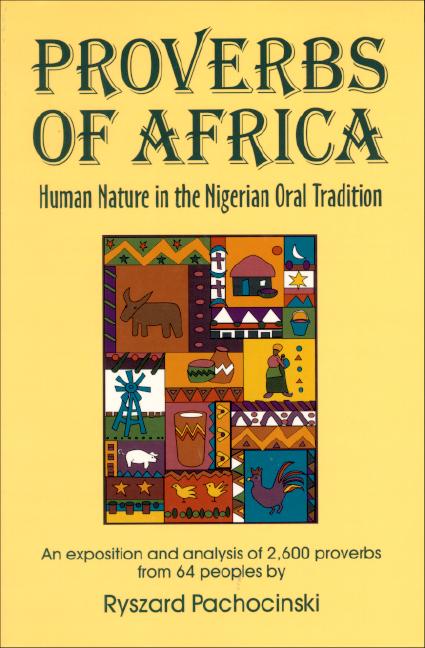“This is one of the best compilations of proverbs
that I have seen. This collection indicates that the Africans have distilled
over millennia their basic values and have encapsulated these values in
the form of proverbs. Proverbs are pithy and easy to understand. They have
been used for didactic purposes to train the young, and also to express
ideas and values to others.
What we have here
is an extraordinary range and rich mix of proverbs dealing with all aspects
of life. Despite the vast range of cultures, there appears to be a common
view about the world. It should be a valuable resource to all persons interested
in the oral and living traditions of Africa.”–Elliott P.
Skinner, former U.S. Ambassador to Upper Volta (Burkina Faso), Franz Boas
Professor of Anthropology, Columbia University, Author of Roots of Time:
A Portrait of African Life and Culture
“The oral tradition of passing on stories and
riddles, songs and legends plays a vital role in the cultures of the peoples
of Nigeria. African proverbs reach deep into the wells of wisdom, abundantly
springing forth and enriching generation after generation.
Pachocinski
has achieved for the proverbs of Nigeria what Jan Knappert has done for
the myths and legends of the Swahili. He introduces these treasures to
readers in the English language, allowing for a better grasp of the underlying
beliefs and values of Africa’s most populous nation.”–Kenneth
R. Gray, Editor of The Second Scramble for Africa and Associate
Professor of International Business, Florida A&M University
“Proverbs of Africa is an excellent book...by far the most important work on West African proverbs since the work of Rattray.”–Jan Knappert, Senior Researcher, Institute of African and Oriental Studies, University of London
“The stimulus for this work was provided by my stay at Ahmadu
Bello University, Zaria, Nigeria, 1975-1985. I understood that the tribal
culture within the oral tradition has been passing away together with the
older generations.... Fortunately, I had many students who became a primary
source for the description and analysis of proverbs of the various Nigerian
peoples. Over 300 students participated in this project.... The students
followed a unifed format of description consisting of four points:
1. Exposition of a proverb in an indigenous language.
2. Word for word sublinear translation into English.
3. Translation into literary English.
4. Description of how the proverb functions in society.
The proverbs were verified as to their authenticity by the staff
of the Department of Nigerian Languages at Ahmadu Bello University.”–From
the author’s preface
RYSZARD PACHOCINSKI is a Professor of Comparative Education at the Institute for Educational Research in Warsaw and a Faculty of Education Professor at the University of Warsaw at Bialystok, Poland. He is the author of many books including Proverbs of Africa, Comparative Education: A Textbook for Education Students, Teacher Education in the European Union, and Comparative Education: An Outline of Research and Methodology.






